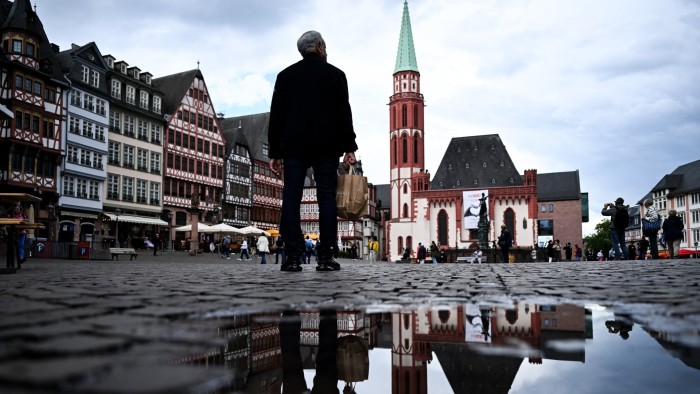Stay informed with free updates
Simply sign up to the German economy myFT Digest — delivered directly to your inbox.
Germany’s economy shrank by 0.3 per cent in the second quarter, a sharper contraction than previously estimated, according to official data published on Friday.
A flash estimate in July had originally pointed to a contraction of 0.1 per cent in the April to July period. Friday’s revision reflects a deeper slump in manufacturing and investment than initially thought.
Germany was pushed back “into recessionary territory”, Carsten Brzeski, ING’s global head of macro, wrote in a note after Friday’s release. “It looks increasingly unlikely that any substantial recovery will materialise before 2026.”
German GDP has contracted in six of the past 10 quarters and is hovering at its 2019 level. The second-quarter drop — the largest in a year — offsets a better than expected performance in the first three months, when Europe’s biggest economy grew 0.3 per cent as exports to the US surged in anticipation of tariffs by US President Donald Trump.
Chancellor Friedrich Merz has loosened Germany’s strict debt brake and promised to embark on a €1tn debt-funded investment spree over the coming years, with economists predicting that positive growth effects will become visible next year.
German growth will pick up over “the coming quarters”, said Ralph Solveen, economist at Commerzbank. He pointed to positive effects from lower European Central Bank interest rates, which were halved to 2 per cent over the past 12 months, and Germany’s coming fiscal expansion. But he also warned that the recovery was likely to be “very modest”.
Following the US-EU trade deal agreed in late July, traders have scaled back their expectations for further rate cuts by the ECB this year. They are now pricing in a probability of less than 50 per cent for another quarter-point reduction by December.
ECB president Christine Lagarde warned on Wednesday that the boost at the start of the year from companies rushing out exports to get ahead of US tariffs was “now reversing”. “The expected slowdown in euro area growth was already evident in the second quarter of this year,” she said at a panel discussion in Geneva.
Germany’s exports of goods fell 0.6 per cent in the second quarter. Capital goods investments dropped 1.9 per cent, partly driven by a sharp decline in corporate vehicle purchases. Construction was down 2.1 per cent. The slump was partly offset by a 0.8 per cent increase in government consumption and a 0.1 per cent rise in private consumption.
“The fall in investment was much stronger than we anticipated,” said Melanie Debono, an analyst at Pantheon Macroeconomics.
Read the full article here
